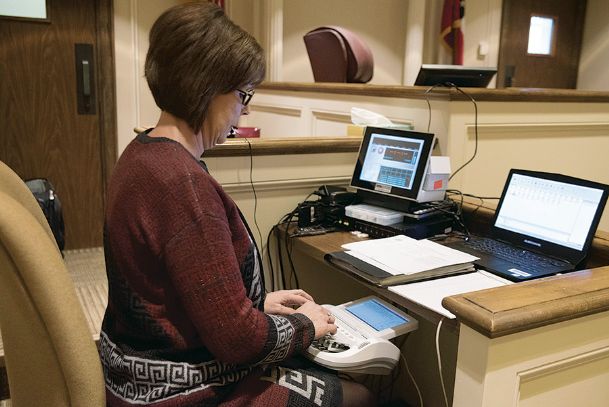
Court reporters are some of the most important people in our judicial system, yet many people still don’t quite understand what they do or why their job is so vital. If you’ve ever been curious about what a court reporter does, or if you’re considering a career in this field yourself, then you’ve come to the right place. In this post, we’ll explore what court reporters are, why they’re such an essential part of the legal process, and what it takes to become one yourself. So let’s dive in!
Contents
- What is a Court Reporter?
- How to Become a Court Reporter
- Court Reporter FAQs
- Is a court reporter a good career?
- What exactly do court reporters do?
- What is the demand for a court reporter?
- Can you teach yourself to be a court reporter?
- Is being a court reporter hard?
- How much does a court reporter charge per hour?
- What is the average salary for a court reporter?
- Can you work from home as a court reporter?
- What tools do you need to be a court reporter?
- How long does it take to get a court reporter certification?
- Are there any online court reporter programs?
- What is the difference between a court reporter and a stenographer?
- Conclusion
What is a Court Reporter?
First, let’s define what exactly court reporters are. At its most basic level, a court reporter is responsible for creating official transcripts of legal proceedings. This includes not only trials and other courtroom events, but also depositions, arbitrations, and other legal meetings. The transcripts created by court reporters are used by attorneys, judges, and other legal professionals to review and analyze the events that took place. But the job goes beyond just recording what was said – court reporters must also ensure that the transcript is accurate and complete, and that any technical terms or jargon are spelled correctly.
So, why is this job so important? Essentially, court reporters serve as the official record-keepers of our legal system. Their transcripts are used not only during the trial or legal proceeding itself, but also years down the road if a case needs to be reviewed or appealed. Without accurate and reliable transcripts, our legal system simply wouldn’t function correctly. Additionally, court reporters play an important role in ensuring that all participants in a legal proceeding are able to communicate effectively. For example, if a witness or attorney has a hearing impairment, the court reporter may need to provide real-time captioning so that they can follow along with what’s being said.
How to Become a Court Reporter

Now that you understand what court reporters do and why their job is so important, you may be wondering how to become one yourself. First and foremost, you’ll need to complete a training program specifically designed for court reporters. These programs typically take between one and three years to complete, and may be offered at community colleges, technical schools, or online. During your training, you’ll learn the necessary skills for the job, including stenography, grammar, and legal terminology.
Once you’ve completed your training, you’ll need to become certified by passing a national exam. This exam will test your knowledge of stenography, as well as your ability to transcribe legal proceedings accurately and efficiently. Different states may have different certification requirements, so be sure to research what’s needed in your state.
After becoming certified, you’ll likely want to become a member of a professional organization like the National Court Reporters Association (NCRA). These organizations can help you stay up-to-date on the latest trends and techniques in the field, network with other court reporters, and find job opportunities.
Court Reporter FAQs
Let’s now delve into some frequently asked questions about the court reporting profession and provide detailed answers to alleviate any concerns or confusion that aspiring court reporters might have.
Is a court reporter a good career?
Yes, court reporting is a great career choice. Not only are you helping to ensure that the legal system runs smoothly and efficiently, but you also get to work with interesting people in an exciting environment. You’ll also be able to enjoy job security since court reporters are always in high demand.
What exactly do court reporters do?
A court reporter is responsible for recording and transcribing legal proceedings. This includes not only trials, but also depositions, arbitrations, and other meetings. Court reporters must ensure that all transcripts are accurate, complete, and free of any mistakes or typos.
What is the demand for a court reporter?
The demand for court reporters is always high since they are such an essential part of the legal process. Additionally, due to advances in technology, many court reporters are now able to work remotely and offer their services online, which has further increased the demand for their skills.
Can you teach yourself to be a court reporter?
While it is possible to teach yourself the basic skills needed for court reporting, such as stenography and grammar, it’s highly recommended that you complete a court reporting training program. This will not only give you the opportunity to learn from experienced professionals in the field, but also provide you with invaluable hands-on experience.
Is being a court reporter hard?
Becoming a court reporter does require hard work and dedication. You’ll need to complete a training program, become certified, and keep up on the latest trends in the field. However, with the right attitude and effort, becoming a court reporter can be an incredibly rewarding experience.
How much does a court reporter charge per hour?
The amount a court reporter charges per hour can vary depending on a number of factors, including location and experience level. On average, court reporters in the United States charge between $125 and $175 per hour for their services. This makes for a high-paying side hustle if you if want to freelance for lawyers doing depositions.
What is the average salary for a court reporter?
The salary of a court reporter will vary depending on their experience, the type of job they’re doing, and the location. On average, court reporters can expect to make between $40,000 and $60,000 per year. However, some experienced court reporters may be able to earn upwards of $100,000 annually.
Can you work from home as a court reporter?
Yes, many court reporters now work from home or remotely due to advances in technology. This has opened up the possibility for court reporters to offer their services online and provide transcripts to clients around the world.
What tools do you need to be a court reporter?
The exact tools a court reporter needs will depend on the type of job they’re doing. However, some of the most essential tools include a stenographic machine, computer, and transcription software. Additionally, many court reporters also use headsets to improve sound quality while they’re working.
How long does it take to get a court reporter certification?
It typically takes between one to three years to become a certified court reporter. This timeframe includes the time needed to complete a training program and pass the required exams.
Are there any online court reporter programs?
Yes, there are some online court reporting programs available for those who want more flexibility when it comes to their education. Online programs generally provide the same level of education as traditional programs, and you’ll still need to complete the required exams in order to become certified.
What is the difference between a court reporter and a stenographer?
A court reporter and a stenographer are often used interchangeably, but there is actually a distinct difference between the two professions. Court reporters are responsible for transcribing legal proceedings to create an official record of events. Stenographers, on the other hand, specialize in shorthand transcription of conversations or speeches in real time.
Conclusion
Becoming a court reporter can be a truly rewarding career path for those who are interested in the legal field and have an eye for detail. As the official record-keeper of our legal system, court reporters play a vital role in ensuring that justice is served and that legal proceedings remain transparent and accountable. If you’re considering becoming a court reporter yourself, be prepared to put in some serious work – but know that the end result is a fulfilling and valuable job that you can be proud of.
Image Source: A court reporter shortage: Critical field faces lack of new recruits via The Dispatch




